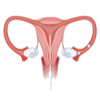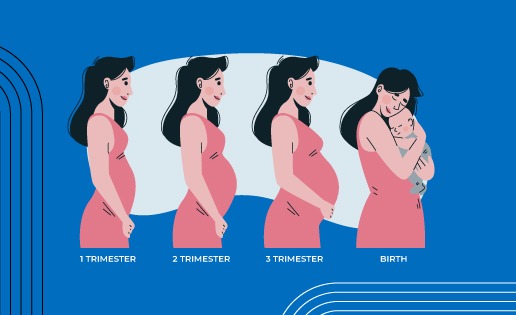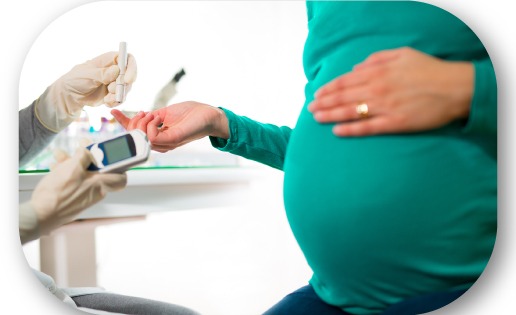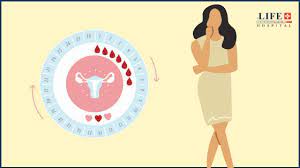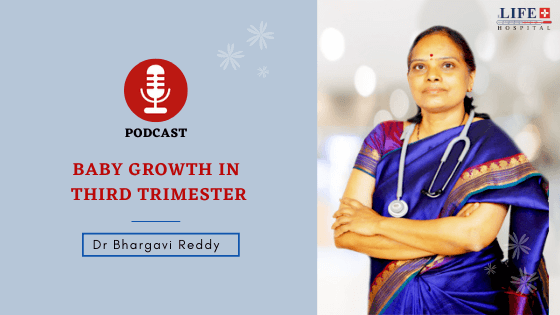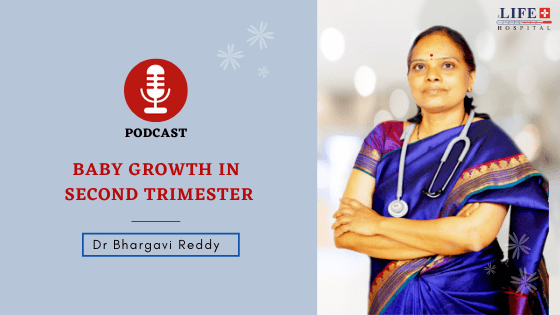Modern and advanced female infertility treatment with guaranteed results
Now get the best in-class treatment for female inefertility at the specialised fertility center of The Life Plus Hospital.
THE LIFE PLUS HOSPITAL is COVID 19 Safe
1. Our Hospital premises are COVID safe
2. Regular sanitization of clinic & hospital premises
3. Immediate medical assistance through Online Consultation
Modern and advanced female infertility treatment with guaranteed results
Now get the best in-class treatment for female inefertility at the specialised fertility center of The Life Plus Hospital.
THE LIFE PLUS HOSPITAL is COVID 19 Safe
- Our Hospital premises are COVID safe
- Regular sanitization of clinic & hospital premises
- Immediate medical assistance through Online Consultation

What is female infertility?
Infertility is defined as the inability of a woman to get pregnant even after having frequent intercourses for at least a year. The most couples indulge in unprotected sex 2-3 times a week to be able to conceive. But, when pregnancy does not occur even after one year, and after diagnosis, the woman is confirmed to have a certain problem, she should get treated or seek medical help. It is important to note that female infertility is not always the reason for the woman not getting pregnant infertility can be a result from problems in the man, the woman, or both the partners. A woman should not be considered infertile without proper medical diagnosis. To understand if a woman is infertile or not, proper diagnosis is of utmost importance.
Let's Schedule Your Appointment
Treatment

Diagnosis
If you are unable to conceive after regular unprotected sex for more than a year, seek medical help. To confirm infertility, and to help you with the best treatment, the doctor needs to do a few tests. This may include ovulation testing, a blood test, hysterosalpingography, ovarian reserve testing, hormone testing. Besides these, the doctor will also need to do imaging tests to look for any uterine or fallopian tube disease. A laparoscopic test can also help the doctor to identify endometriosis, blockages or any other abnormalities in the fallopian tubes, ovaries or uterus.
Treatment
The treatment will depend on the evaluation of the infertility. Depending on the cause, the doctor might suggest medication or surgery.
The doctor might recommend medications like Clomiphene which are used to stimulate the ovary to release one or more eggs. The medications also work to adjust your hormonal levels. The doctor might also recommend Luteinizing hormone and follicle stimulating hormone which are used to stimulate the ovaries to release eggs.
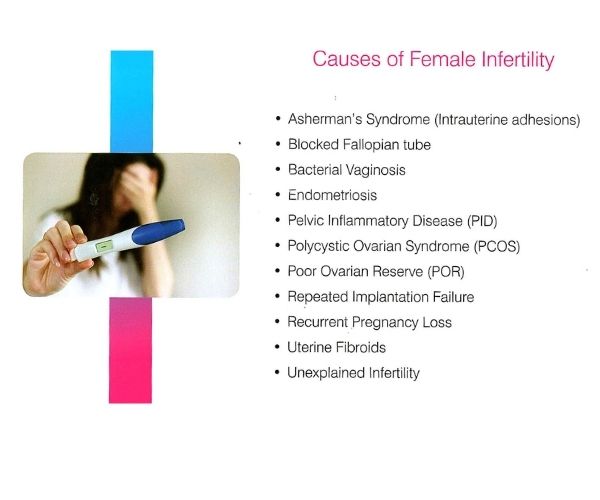

Our Doctors
Why The Life Plus Hospital?
 The Life Plus Hospital is COVID-19 safe
The Life Plus Hospital is COVID-19 safe
Your safety is taken care of by thermal screening, social distancing, sanitized clinics, and hospital rooms, sterilized surgical equipment, and mandatory PPE kits during surgery.
 Medical Expertise With Technology
Medical Expertise With Technology
Our Doctors spend a lot of time with you to diagnose your condition. You are assisted in all pre-assisted Hospitalisation process. We offer advanced laser and laparoscopic surgical treatment. Our procedures are USFDA approved.
 Assisted Surgery Experience
Assisted Surgery Experience
A dedicated Medical Coordinator assists you throughout the surgery journey from insurance paperwork, to free commute from home to hospital & back and admission-discharge process at the hospital.
 Post Natal Care
Post Natal Care
We offer free follow-up consultations and instructions including dietary tips as well as exercises to every patient to ensure they have a smooth recovery to their daily routines.
The Life Plus Hospital in Numbers
IVF / ICSI
Surrogacy
IUI
Healthy IVF Babies
Infertility is defined as trying to get pregnant (with frequent intercourse) for at least a year with no success. Female infertility, male infertility or a combination of the two affects millions of couples in the United States. An estimated 10 to 18 percent of couples have trouble getting pregnant or having a successful delivery.
Infertility results from female factors about one-third of the time and male factors about one-third of the time. The cause is either unknown or a combination of male and female factors in the remaining cases.
Female infertility causes can be difficult to diagnose. There are many available treatments, which will depend on the cause of infertility. Many infertile couples will go on to conceive a child without treatment. After trying to get pregnant for two years, about 95 percent of couples successfully conceive.
How common is female infertility?
Infertility is a common disease. At least 10% of women deal with infertility of some kind. The chances of being infertile increases as a woman ages.
Symptoms
The main symptom of infertility is the inability to get pregnant. A menstrual cycle that’s too long (35 days or more), too short (less than 21 days), irregular or absent can mean that you’re not ovulating. There may be no other outward signs or symptoms.
When to see a doctor
When to seek help sometimes depends on your age:
- Up to age 35, most doctors recommend trying to get pregnant for at least a year before testing or treatment.
- If you’re between 35 and 40, discuss your concerns with your doctor after six months of trying.
- If you’re older than 40, your doctor may want to begin testing or treatment right away.
Your doctor may also want to begin testing or treatment right away if you or your partner has known fertility problems, or if you have a history of irregular or painful periods, pelvic inflammatory disease, repeated miscarriages, prior cancer treatment, or endometriosis.
Each of these factors is essential to become pregnant:
- You need to ovulate. To get pregnant, your ovaries must produce and release an egg, a process known as ovulation. Your doctor can help evaluate your menstrual cycles and confirm ovulation.
- Your partner needs sperm. For most couples, this isn’t a problem unless your partner has a history of illness or surgery. Your doctor can run some simple tests to evaluate the health of your partner’s sperm.
- You need to have regular intercourse. You need to have regular sexual intercourse during your fertile time. Your doctor can help you better understand when you’re most fertile.
- You need to have open fallopian tubes and a normal uterus. The egg and sperm meet in the fallopian tubes, and the embryo needs a healthy uterus in which to grow.
For pregnancy to occur, every step of the human reproduction process has to happen correctly. The steps in this process are:
- One of the two ovaries releases a mature egg.
- The egg is picked up by the fallopian tube.
- Sperm swim up the cervix, through the uterus and into the fallopian tube to reach the egg for fertilization.
- The fertilized egg travels down the fallopian tube to the uterus.
- The fertilized egg implants and grows in the uterus.
In women, a number of factors can disrupt this process at any step. Female infertility is caused by one or more of the factors below.
Ovulation disorders
Ovulation disorders, meaning you ovulate infrequently or not at all, account for infertility in about 1 in 4 infertile couples. Problems with the regulation of reproductive hormones by the hypothalamus or the pituitary gland, or problems in the ovary, can cause ovulation disorders.
- Polycystic ovary syndrome (PCOS).PCOS causes a hormone imbalance, which affects ovulation. PCOS is associated with insulin resistance and obesity, abnormal hair growth on the face or body, and acne. It’s the most common cause of female infertility.
- Hypothalamic dysfunction. Two hormones produced by the pituitary gland are responsible for stimulating ovulation each month — follicle-stimulating hormone (FSH) and luteinizing hormone (LH). Excess physical or emotional stress, a very high or very low body weight, or a recent substantial weight gain or loss can disrupt the production of these hormones and affect ovulation. Irregular or absent periods are the most common signs.
- Premature ovarian failure. Also called primary ovarian insufficiency, this disorder is usually caused by an autoimmune response or by premature loss of eggs from your ovary (possibly from genetics or chemotherapy). The ovary no longer produces eggs, and it lowers estrogen production in women under the age of 40.
- Too much prolactin. The pituitary gland may cause excess production of prolactin (hyperprolactinemia), which reduces estrogen production and may cause infertility. Usually related to a pituitary gland problem, this can also be caused by medications you’re taking for another disease.
Damage to fallopian tubes (tubal infertility)
Damaged or blocked fallopian tubes keep sperm from getting to the egg or block the passage of the fertilized egg into the uterus. Causes of fallopian tube damage or blockage can include:
- Pelvic inflammatory disease, an infection of the uterus and fallopian tubes due to chlamydia, gonorrhea or other sexually transmitted infections
- Previous surgery in the abdomen or pelvis, including surgery for ectopic pregnancy, in which a fertilized egg implants and develops in a fallopian tube instead of the uterus
- Pelvic tuberculosis, a major cause of tubal infertility worldwide, although uncommon in the United States
Endometriosis
Endometriosis occurs when tissue that normally grows in the uterus implants and grows in other locations. This extra tissue growth — and the surgical removal of it — can cause scarring, which may block fallopian tubes and keep an egg and sperm from uniting.
Endometriosis can also affect the lining of the uterus, disrupting implantation of the fertilized egg. The condition also seems to affect fertility in less direct ways, such as damage to the sperm or egg.
Uterine or cervical causes
Several uterine or cervical causes can impact fertility by interfering with implantation or increasing the likelihood of a miscarriage:
- Benign polyps or tumors (fibroids or myomas) are common in the uterus. Some can block fallopian tubes or interfere with implantation, affecting fertility. However, many women who have fibroids or polyps do become pregnant.
- Endometriosis scarring or inflammation within the uterus can disrupt implantation.
- Uterine abnormalities present from birth, such as an abnormally shaped uterus, can cause problems becoming or remaining pregnant.
- Cervical stenosis, a narrowing of the cervix, can be caused by an inherited malformation or damage to the cervix.
- Sometimes the cervix can’t produce the best type of mucus to allow the sperm to travel through the cervix into the uterus.
Unexplained infertility
Sometimes, the cause of infertility is never found. A combination of several minor factors in both partners could cause unexplained fertility problems. Although it’s frustrating to get no specific answer, this problem may correct itself with time. But, you shouldn’t delay treatment for infertility
Risk factors
Certain factors may put you at higher risk of infertility, including:
- The quality and quantity of a woman’s eggs begin to decline with increasing age. In the mid-30s, the rate of follicle loss speeds, resulting in fewer and poorer quality eggs. This makes conception more difficult and increases the risk of miscarriage.
- Besides damaging your cervix and fallopian tubes, smoking increases your risk of miscarriage and ectopic pregnancy. It’s also thought to age your ovaries and deplete your eggs prematurely. Stop smoking before beginning fertility treatment.
- Being overweight or significantly underweight may affect normal ovulation. Getting to a healthy body mass index (BMI) may increase the frequency of ovulation and the likelihood of pregnancy.
- Sexual history. Sexually transmitted infections such as chlamydia and gonorrhea can damage the fallopian tubes. Having unprotected intercourse with multiple partners increases your risk of a sexually transmitted infection that may cause fertility problems later.
- Stick to moderate alcohol consumption of no more than one alcoholic drink per day.
How does age impact female infertility?
As a woman ages, her chances of becoming pregnant decrease. Age is becoming a more common factor in female infertility because many couples are waiting to have children until their 30s or 40s. Women over age 35 have a higher risk of having fertility issues. The reasons for this include:
- The overall number of eggs is lower.
- More eggs have an abnormal number of chromosomes.
- An increased risk of other health conditions.
Prevention
For women thinking about getting pregnant soon or in the future, these tips may help optimize fertility:
- Maintain a normal weight. Overweight and underweight women are at increased risk of ovulation disorders. If you need to lose weight, exercise moderately. Strenuous, intense exercise of more than five hours a week has been associated with decreased ovulation.
- Quit smoking. Tobacco has multiple negative effects on fertility, not to mention your general health and the health of a fetus. If you smoke and are considering pregnancy, quit now.
- Avoid alcohol. Heavy alcohol use may lead to decreased fertility. And any alcohol use can affect the health of a developing fetus. If you’re planning to become pregnant, avoid alcohol, and don’t drink alcohol while you’re pregnant.
- Reduce stress. Some studies have shown that couples experiencing psychological stress had poorer results with infertility treatment. If you can, find a way to reduce stress in your life before trying to become pregnant.
- Limit caffeine. Research suggests that limiting caffeine intake to less than 200 milligrams a day shouldn’t affect your ability to get pregnant. That’s about one to two cups of 6 to 8 ounces of coffee per day.
What will my doctor ask during an appointment to diagnose female infertility?
Your healthcare provider will need to know about your menstrual periods, any past pregnancies, miscarriages, pelvic pain, unusual vaginal bleeding, or discharge. You may also be asked about any past pelvic infections or sexually transmitted infections (STIs). Some questions may include:
- Have you had any previous pregnancies or miscarriages?
- Is your menstrual cycle normal and regular or painful and irregular?
- Do you have heavy bleeding or abnormal discharge?
- Do you have any pelvic pain?
- Have you had any abdominal surgeries in the past?
What tests will my healthcare provider run to diagnose female infertility?
Some tests may be done in your healthcare provider’s office as a physical exam. These tests may include:
- An overall physical exam.
- A Pap test.
- A pelvic exam.
- A pelvic ultrasound.
- An examination of the breasts for unusual milk production.
Other tests may need to be done in a lab. These tests can include:
- Blood tests: The type of lab tests will depend on your health history and what diagnoses your doctor is considering. Examples of lab tests include thyroid testing, prolactin levels, tests of ovarian reserve and progesterone (a hormone produced during the menstrual cycle that signals ovulation).
- X-ray hysterosalpingogram (HSG): A dye is injected into the cervix and the caregiver watches how the dye moves through the fallopian tube with an X-ray. This test checks for blockages.
- Laparoscopy: In this test, a small monitoring instrument called a laparoscope is inserted into the abdomen to look at the organs.
- Transvaginal ultrasound: Unlike an abdominal ultrasound (where the probe is placed over the belly), this test is done by inserting an ultrasound wand into the vagina. It allows the healthcare provider a better view of organs like the uterus and ovaries.
- Saline sonohysterogram (SIS): This test is used to look at the lining of the uterus and assess for polyps, fibroids or other structural abnormalities. Saline (water) is used to fill the uterus, allowing the healthcare provider to get a better view of the uterine cavity during a transvaginal ultrasound.
- Hysteroscopy: In this test, a device called a hysteroscope (a flexible, thin device with a camera on it) is inserted into the vagina and through the cervix. The healthcare provider moves it into the uterus to view the inside of the organ.
Packages:
Fertility Package: INR 7000.00
Includes:
- Pelvic Scan And Abdominal Scan
- LH
- FSH
- TSH
- Prolactin
- Estrogen( Estradiol)
- AMH
- Blood Routine
- Serology (HIV, HBsAg, VDRL, HCV)
Future Fertility Package (For Implantation Failure Patients) : INR 12,000.00
Includes:
- ANA Profile
- ATA
- Homocysteine
- Factor VIII
- Anti TPO
- At-Protein C and S
Get in Touch
Tell us about your problems and we’ll figure out the best treatment option for you.
Life Plus hospital
Women and Child Care Hospital in Indiranagar | LifePlus Hospital
At Life plus hospital, we offer a comprehensive range of women’s health services. The Department is managed by highly experienced lady gynecological doctors who offer specialized attention and compassionate care for women
Let's Schedule Your Appointment
IUI & IVF Success Story
https://youtu.be/3sBjEYtzV2Y
Female Infertility Faq's
Infertility is found in both men and women and it affects nearly an equal number of men and women. Approximately one-third of infertility is attributed to the female partner, one-third is attributed to the male partner and one-third is caused by a combination of problems in both partners. However, about 20 percent of infertility cases remain “unexplained” even after a full diagnostic work-up.
Symptoms for women can include:
- Abnormal, irregular or painful periods
- No periods
- Skin changes, including more acne
- Changes in sex drive and desire
- Dark hair growth on the lips, chest and chin
- Loss of hair or thinning hair
- Unexplained weight gain
- Hot flashes
- Painful intercourse or inability to have intercourse
- Milky breast discharge
Symptoms for men can include:
- Pain, lump or swelling in the testicles
- Problems with erections and ejaculations
- Small, firm testicles
- Changes in hair growth
- Changes in sexual desire
Yes. Age is the single most important factor that influences a woman’s fertility. A woman is born with all the eggs she will ever have. As a woman ages, her eggs also age, and they diminish in quantity and quality. Currently, there are no methods or treatments available to stop or reverse that process. At age 30, a woman’s chance of conceiving each month is about 20 percent. At 40, it’s about 5 percent.
A fertility evaluation should begin with a medical history of both the female and male partners. Both partners will then be asked to undergo a physical exam, including a gynecological exam and pelvic ultrasound for the woman.







